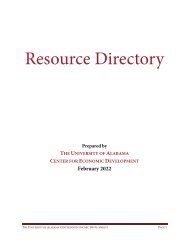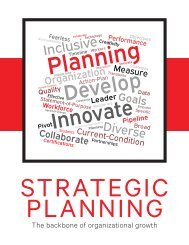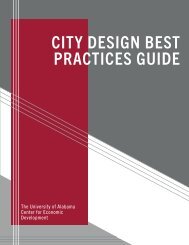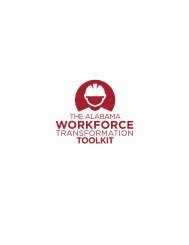You also want an ePaper? Increase the reach of your titles
YUMPU automatically turns print PDFs into web optimized ePapers that Google loves.
EVENT MANAGEMENT<br />
The University of Alabama<br />
Center for Economic<br />
Development
PLANNING A FESTIVAL/EVENT<br />
TIPS AND INITIAL STEPS<br />
Do not be afraid to outsource.<br />
For example, use a specialized music production company<br />
for sound equipment, speakers, stage, etc.<br />
Start small.<br />
Do not bite off more than you can chew. A smaller, wellorganized<br />
festival is much more enjoyable to attendees<br />
than a chaotic big one.<br />
Take plenty of time to plan.<br />
So many details go into a festival. Give yourself enough<br />
time to deal with unexpected issues<br />
LEGALITIES AND RISK MANAGEMENT<br />
Have security.<br />
Check with your city, as there may be rules in place about<br />
police patrol at public events.<br />
Get the right permits.<br />
Work with local city government to learn the appropriate<br />
processes to secure the correct permits, including Health<br />
Department permits for food and beverage sales.<br />
Apply for tax-exempt status.<br />
Consider registering as a nonprofit corporation. May<br />
protect against lawsuits and some permits may require it.<br />
Create a committee.<br />
You do not have to undertake this huge task by yourself.<br />
Create a dedicated committee to delegate tasks to.<br />
Create an objective and purpose.<br />
Why would people want to come to this? From this, choose<br />
a theme and name. This may affect the date, if the festival<br />
relates to certain flowers blooming, for example.<br />
Make a budget and stick to it.<br />
Consider fundraising, finances and sponsorships. Selling<br />
or giving away booth space (entertainers, vendors,<br />
etc.) percent of sales. Food, beverage or souvenir sales.<br />
Admission fee, parking fee. Corporate sponsorships, in<br />
return for logo placement on the festival grounds.<br />
Plan the space.<br />
Use an aerial map and an online program like Word/<br />
PowerPoint or write on it, but plan out where tents,<br />
attractions, restrooms, First Aid, information booths, etc.<br />
will all be set up<br />
The University of Alabama Center for Economic Development - <strong>Event</strong> <strong>Management</strong> Page 2
SOCIAL MEDIA<br />
HOW TO UTILIZE SOCIAL MEDIA FOR MARKETING<br />
Make yourself knowledgeable and do research.<br />
• What demographics are on what platforms?<br />
• When is the best time to post for each platform?<br />
• What type of media belongs on each platform?<br />
• What are your competitors doing?<br />
• There are numerous articles online with best practices<br />
and tips for maintaining a quality social media<br />
presence. Read to stay up-to-date on current trends.<br />
Choose the best for your business.<br />
Do not hop on the bandwagon for the latest social media<br />
platform if it does not align with your company’s values<br />
and vision. This is where knowing the demographics on<br />
each platform becomes helpful; find where your audience<br />
spends their online time.<br />
Have a purpose with your posts.<br />
Include a call-to-action, hashtag or a link back to your<br />
website. Don’t do this every time, as you don’t want to just<br />
be pushing your product constantly (see the next tip!) but<br />
you do want to make sure your audience knows what to do<br />
or where to go if they are interested.<br />
Be prepared to interact with, not just talk at, your<br />
audience and customers.<br />
Interact with your audience. Unlike traditional advertising<br />
and marketing, social media allows the audience to<br />
converse with you. They can also bring complaints or<br />
compliments your way. Be ready to listen and respond<br />
appropriately and compassionately. At least acknowledge<br />
every mention.<br />
Be consistent and plan it out.<br />
Create a social media calendar. This is an Excel spreadsheet<br />
or a normal calendar where every social media post is<br />
planned. Categories in the columns may include platform<br />
choice, written content, any media (videos or photos) in<br />
the post, what day and time it will go out, and any other<br />
notes about the post. By planning ahead of time, this<br />
removes the stress of coming up with daily posts.<br />
Get on the good side of influencers.<br />
Many people follow certain individuals, called influencers.<br />
Their opinion is respected and they can lead people to like/<br />
dislike a brand based on their opinion. Find influencers<br />
who have quality audiences and might like your products<br />
or services. Build relationships with them - do not just gift<br />
them with a product once and then never talk - truly build<br />
and nurture a relationship.<br />
Make sure all posts are “on brand.”<br />
This means that each post belongs. The posts that<br />
advertise or represent the company are in line with the<br />
persona/messaging of the brand.<br />
Get on a routine within each platform.<br />
Some platforms allow you to post multiple times a day, and<br />
some prefer posts a couple times a week. This also varies<br />
based on your company’s needs. Remember, quality<br />
trumps quantity.<br />
Evaluate and change course if needed.<br />
Track your changes on social media or you will not know<br />
how you are doing. Every week, record the number of<br />
followers, interactions, etc. Most platforms provide<br />
analytics for this.<br />
The University of Alabama Center for Economic Development - <strong>Event</strong> <strong>Management</strong> Page 3
EVENT MARKETING PLANS 101<br />
Marketing plans are crucial to a successful event in order to recruit partners, volunteers, and attendees. Considering each<br />
of these points can take the success of an event to the next level.<br />
SOCIAL MEDIA<br />
Facebook.<br />
• Create an event page/ start promoting your event from<br />
your existing organization page.<br />
• Create a “cover photo” (banner) for your profile page<br />
that promotes your event.<br />
• Video is pushed to top of the feed, so more people see<br />
it and you get more exposure<br />
(hence: more followers).<br />
• Before your event, Instagram photos of your<br />
promotional flyers and invitations.<br />
• If it is a themed event, maybe Instagram a picture of<br />
decorations being set up to raise excitement.<br />
• During the event, Instagram pictures of guests,<br />
speakers, etc.<br />
Twitter.<br />
• Does your organization already have a Twitter handle?<br />
• If not, create a new handle.<br />
• Will you be promoting it through your existing<br />
handle?<br />
• Create a hashtag specifically for your event.<br />
• #LucyJordanBa112014, #RelayForLife2014<br />
• The hashtag can also be used on Instagram.<br />
• Tweet pertinent information to your attendees.<br />
• If you have a registration process, be sure to tweet<br />
registration deadlines.<br />
• If you have an RSVP date, tweet that as well.<br />
Instagram.<br />
• Does your organization already have an Instagram<br />
account?<br />
• If not, create a new account for your event<br />
• Will you promote it from an existing account?<br />
• Make sure you link your Instagram account with<br />
your Facebook and Twitter accounts so when you<br />
post something to Instagram, all your friends<br />
and followers will see it on Facebook and Twitter<br />
Helpful Hint:<br />
Post-event social activity: Now it is time to share stories,<br />
say thank you and stay connected with.<br />
Thank you tweets, sharing visitors’ photos and sharing<br />
information. In the days after the event, listen for tweets,<br />
mentions and blog posts from others. The hashtag makes<br />
this easy.<br />
LOCAL MEDIA OUTLETS<br />
Television advertising.<br />
• Powerful driver to consumers when introducing a<br />
new brand or product to the market.<br />
• People, who enjoy watching sporting events and/or<br />
other live events, mostly watch them on TV versus<br />
watching through a streaming service; TV ads are not<br />
“skippable.”<br />
• Fragmented Attention Span: Reports say that 70%<br />
of people use mobile devices when they are watching<br />
TV; Since most viewers have their 2nd or 3rd screens<br />
(laptop and/or mobile device) nearby them while<br />
watching TV, they are more than likely to do a<br />
The University of Alabama Center for Economic Development - <strong>Event</strong> <strong>Management</strong> Page 4
search on either the commercial they saw or the<br />
product if it’s relevant to them.<br />
Radio advertising.<br />
• According to Nielsen’s recent “State of the Media:<br />
Audio Today” report, more than 90% of adults listen<br />
to radio; adopting the ways they listen with online<br />
streaming and smartphone applications.<br />
• About 92% of Millennials listen to radio each week,<br />
according to Nielsen’s report.<br />
• Radio personalities connect with listeners in a way<br />
many other kinds of media simply cannot. Listeners<br />
begin to rely on radio personalities as trusted<br />
sources of information.<br />
• Local radio stations are involved in the community.<br />
Stations, hosts and personalities connect with their<br />
listeners both on air and off, and are often “woven into<br />
the fabric” of a community.<br />
NEWSPAPER/LOCAL PUBLICATIONS<br />
• Add your event to the community calendar. Find by<br />
searching Google for “event calendars” in your city.<br />
• Let the press know. Contact them with an invite,<br />
press badge or offer of a relevant article. If you<br />
successfully get their attention, you may get a bit of<br />
press!<br />
• Longer shelf life.<br />
• More purposeful readers that are in a different state<br />
of mind when they choose to engage with print rather<br />
than digital, from task-oriented to leisure.<br />
EMAIL CAMPAIGN<br />
• If you have a list, email marketing may be your best<br />
channel. Ask partners to mention the event in their<br />
emails<br />
• Subject lines that inspire awe, anger, and anxiety<br />
lead to more opens. “5 things you miss if you aren’t at<br />
this event.”<br />
• Consider sending an email on the weekend. Since<br />
few companies do it, open and click through rates may<br />
be higher/may be in a social mood and even invite a<br />
friend.<br />
• Plan to send an event marketing email several<br />
times.<br />
• First send out save the date and speakers/<br />
highlights<br />
• then early bird rate registration<br />
• then agenda and then closing of early bird rates<br />
BILLBOARDS<br />
• Captive Audience – studies have found an average of<br />
20 hours per week in car (driving/passenger)<br />
• Hard to miss and evoke a call to action.<br />
• Clear, easy to read messages perform best – hire<br />
professionals.<br />
• Below are some numbers to consider from The Arbitron<br />
National In-Car Study, 2009 edition, according to the<br />
study, “billboard viewers make shopping decisions<br />
while in the car.”<br />
• 58 % Learned about an event they were interested<br />
in<br />
• 58% Learned about a restaurant they later visited<br />
• 56% Talked about a funny billboard<br />
• 27% Noted a phone number or Web site address<br />
written on an outdoor billboard<br />
• 72% Frequently or sometimes shop on their way<br />
home from work<br />
• 68% Make their shopping decisions while in the car<br />
• 38% Make the decision to stop at the store while<br />
on their way home<br />
• 24% Say they were motivated to visit a particular<br />
store that day because of an outdoor ad<br />
• 24% Said they have immediately visited a business<br />
because of an outdoor ad message<br />
• 32% Visited the retailer they saw on a billboard<br />
later that week<br />
• 50% Reported receiving directional information<br />
from a billboard<br />
Helpful Hint:<br />
If you do not have the budget to hire professionals, offer<br />
free admission (or even a table in the event space) to<br />
a pro photographer or videographer in exchange for<br />
services. Make sure they commit to providing you with<br />
assets in a reasonable timeframe. Make sure you give them<br />
good exposure in exchange for their time.<br />
The University of Alabama Center for Economic Development - <strong>Event</strong> <strong>Management</strong> Page 5
EVENT MANAGEMENT<br />
HOW TO RUN A MEETING<br />
Decide the frequency of these meetings.<br />
• Daily, weekly, monthly annually? This will affect what<br />
you talk about, in what detail, and for how long.<br />
Write an agenda beforehand.<br />
• Know what you want to talk about and in what order.<br />
Plan for the time allotted.<br />
• Write things out clearly and do not be vague. It helps<br />
people to see what is coming up, form an opinion<br />
about topics, look up facts or numbers they may need<br />
to discuss the topic, etc.<br />
Make the attendance policy clear.<br />
• Is it mandatory? RSVP? Show up if you can make it?<br />
Make sure both you and attendees are clear on this, so<br />
everyone can better plan.<br />
Take notes.<br />
• Either take notes yourself or have someone do it for<br />
you as you speak.<br />
Consider discouraging technology.<br />
• Depending on the room setup, number of people and<br />
meeting purpose, technology like laptops and phones<br />
may be distractions that cause the meeting to derail.<br />
Close on a positive note.<br />
• Thank people for attending.<br />
• Mention the next meeting date and time.<br />
HOW TO BUILD A COMMITTEE<br />
Define the purpose.<br />
Find the right members.<br />
• Does the committee need members with a financial<br />
background? Connections? A certain interest?<br />
Appoint the committee chair.<br />
• This person should have strong leadership skills<br />
and be very well informed about the purpose of the<br />
committee. Whether it’s you or someone else, these are<br />
the general responsibilities of a chair:<br />
• Translate the committee’s purpose into actionable<br />
steps<br />
• Delegate tasks to members<br />
Communicate.<br />
• Communicate with members and the board to make<br />
sure everyone is on the same page<br />
Set meeting times in advance.<br />
• This allows people to plan around the meetings.<br />
Send minutes after the meeting.<br />
• Clarify what happened so everyone is on the same page<br />
and has the same interpretation.<br />
• Include time (beginning and ending), date, where it<br />
was, who led the meeting<br />
• Name all agenda items and decisions reached<br />
• Include any responsibilities given, tasks delegated or<br />
deadlines assigned.<br />
• Time, date and place of the next meeting<br />
Always have a printed agenda.<br />
Always have a sign in sheet.<br />
Appoint a note taker.<br />
• Always have a note taker and email the notes with<br />
action items and who took responsibility.<br />
The University of Alabama Center for Economic Development - <strong>Event</strong> <strong>Management</strong> Page 6
TIMELINE<br />
8-12 MONTHS<br />
• Establish event goals<br />
• Determine budget<br />
• Develop planning committee and assign roles<br />
• Choose a date<br />
• Choose venue<br />
• Create website<br />
• Create a broad plan for marketing and promotion<br />
• Determine an estimated number of guests<br />
• Create a general outline/agenda<br />
• Brainstorm branding/design process<br />
• Send save the date notice<br />
6-7 MONTHS<br />
• Develop key communication messages<br />
• Initiate program and invitation design<br />
• Discuess AV needs<br />
• Send invitations/open registration<br />
• Confirm entertainment and/or speakers<br />
• Start promotion<br />
• Confirm venue<br />
POST EVENT<br />
• Collect feedback<br />
• Send thank yous to participants, staff and volunteers<br />
• File all materials to assist in future event planning<br />
DAY OF SCHEDULE CHECKLIST<br />
• Set-up<br />
• Start time<br />
• Networking time<br />
• Speakers<br />
• Meals<br />
• Breaks<br />
• End time<br />
• Breakdown/clean up<br />
NOTES:<br />
3-5 MONTHS<br />
• Arrange travel and accomodations for out-of-town<br />
guests/participants<br />
• Sign vendor contracts<br />
• Confirm agenda<br />
• Select menu<br />
1-2 MONTHS<br />
• Confirm speakers and gather their biographies<br />
• Confirm vendors<br />
• Discuss day-of-timeline with vendors<br />
• Create a supply list and order as needed<br />
• Reserve security<br />
• Confirm AV<br />
• Close registration<br />
• Design and print signage<br />
• Send reminders to participants<br />
• Send directions, map and parking instructions to<br />
participants<br />
DAY OF<br />
• Arrive early to check setup and troubleshoot issues<br />
• Bring registration materials and extra copies<br />
• Walk through the event with all staff and volunteers<br />
• Check weather<br />
The University of Alabama Center for Economic Development - <strong>Event</strong> <strong>Management</strong> Page 7
















